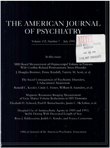Outcome of cognitive-behavioral and support group brief therapies for depressed, HIV-infected persons
Abstract
OBJECTIVE: Although many studies have documented patterns of emotional distress in persons with HIV disease, there have been few controlled evaluations of therapy outcomes with these individuals. This research evaluated the effects of brief cognitive-behavioral or social support group therapy with this population. METHOD: Sixty-eight depressed men with HIV infection were randomly assigned to one of three conditions: eight-session cognitive-behavioral groups, eight-session social support groups, or a comparison condition. Before and after intervention and at 3-month follow-up, all participants were individually assessed by using measures of symptoms of distress as well as substance use and sexual practices. RESULTS: Relative to the comparison group, both the cognitive-behavioral and social support group therapies produced reductions in depression, hostility, and somatization. The social support intervention also produced reductions in overall psychiatric symptoms and tended to reduce maladaptive interpersonal sensitivity, anxiety, and frequency of unprotected receptive anal intercourse, while the cognitive-behavioral intervention resulted in less frequent illicit drug use during the follow-up period. Tests for clinical significance of change particularly underscored benefits of the social support group intervention both at postintervention and at long-term follow-up. CONCLUSIONS: Brief group therapy for depressed persons with HIV infection produced reductions in symptoms of distress. The two forms of therapy resulted in shared and unique improvements in functioning, although social support groups focused on emotional coping presented greater evidence of clinically significant change. As more persons contract HIV infection and live longer with HIV disease, further research is needed to evaluate outcomes of mental health services with these individuals.
Access content
To read the fulltext, please use one of the options below to sign in or purchase access.- Personal login
- Institutional Login
- Sign in via OpenAthens
- Register for access
-
Please login/register if you wish to pair your device and check access availability.
Not a subscriber?
PsychiatryOnline subscription options offer access to the DSM-5 library, books, journals, CME, and patient resources. This all-in-one virtual library provides psychiatrists and mental health professionals with key resources for diagnosis, treatment, research, and professional development.
Need more help? PsychiatryOnline Customer Service may be reached by emailing [email protected] or by calling 800-368-5777 (in the U.S.) or 703-907-7322 (outside the U.S.).



